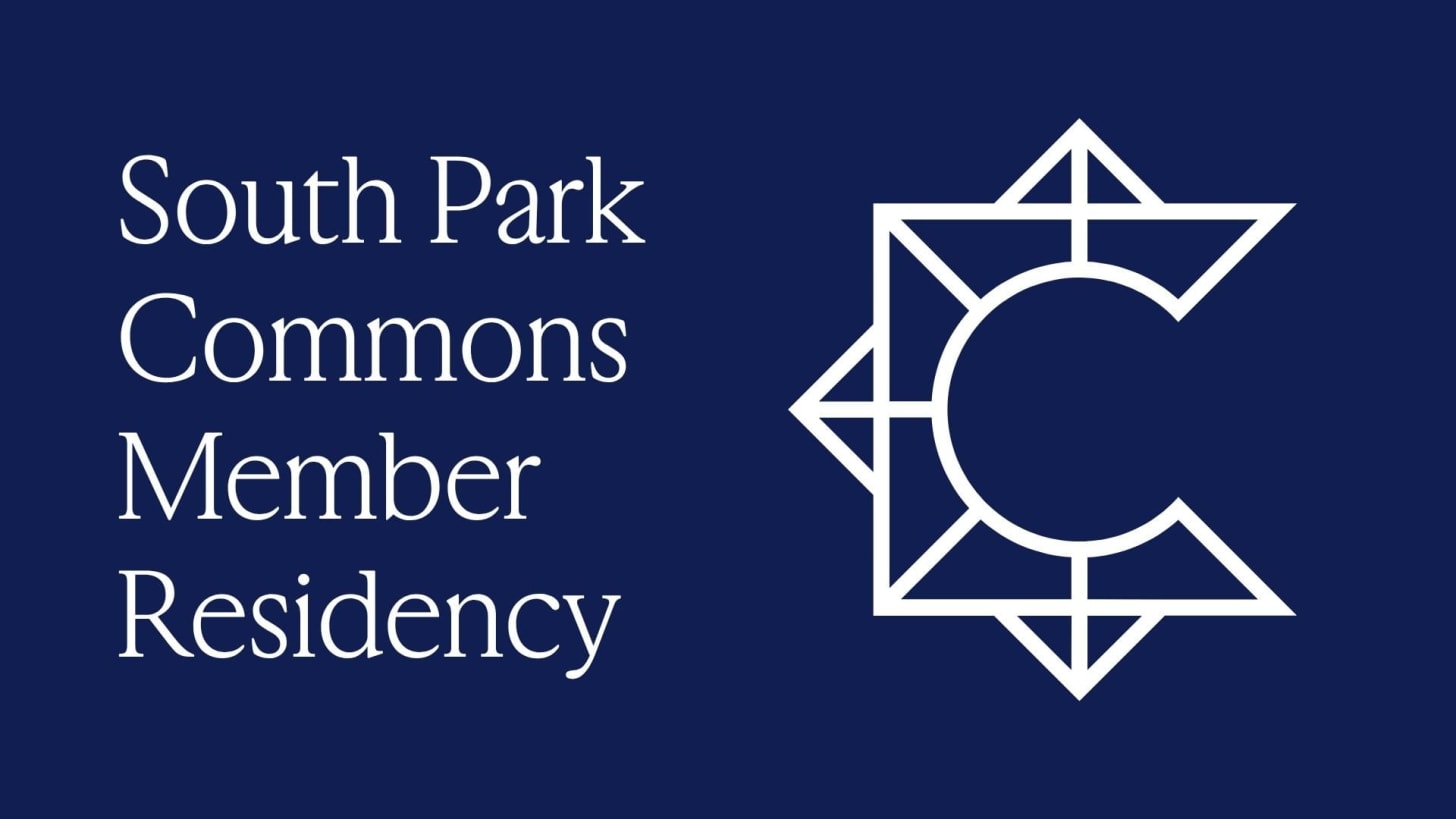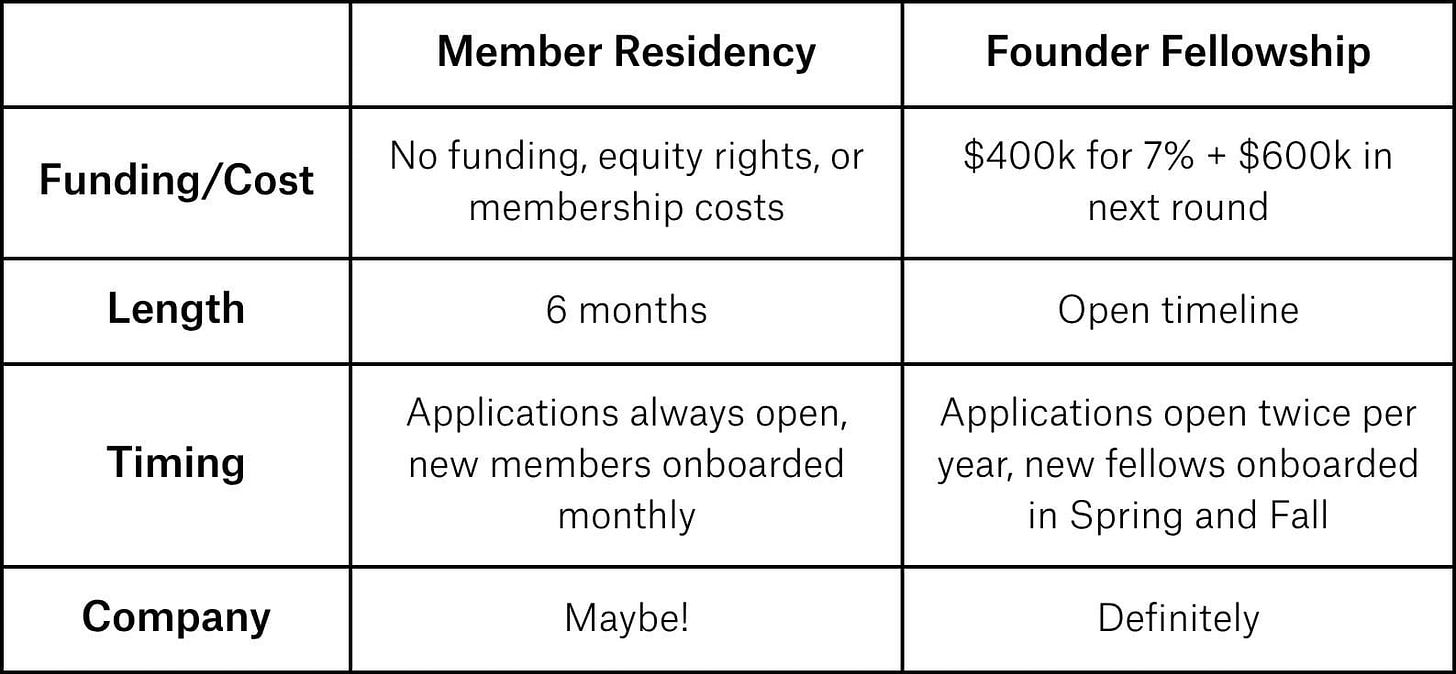What is the SPC Member Residency?
The most talent-dense program for technologists figuring out what to work on next, whether you’re starting a company or not.
Figuring out what to work on should be a full-time endeavor. Whether you’re starting a company, planning the next stage of your research, or simply deciding where and how you want to spend the next decade of your life, -1 to 0 isn’t a side project. Finding your life’s work is hard, no matter when you start. And like any hard thing worth doing, it’s better done with talented peers.
This is why the SPC Member Residency exists, and why applications are always open. There is no cost, no right to invest, and no requirement that you’re starting a company.
When you know you want to do something new, find the most talent-dense environment you can. Talent density is the strongest leading indicator of pace, quality, and long-term success. This is true as companies scale and it is true even before you know if you want to start a company.
It’s also true across disciplines, which is why the Member Residency isn’t limited to startup founders. Technical researchers, open-source software contributors, deep domain experts, Olympic athletes—anyone with a passion for technology trying to build conviction in what’s next is welcome to apply.
The SPC Member Residency is how we maintain the highest density of talent in -1 to 0 anywhere on the planet. It is social scaffolding for generational work. Great talent does best when surrounded by great talent. If you’re figuring out what’s next, apply to join these past SPC Member Residents:
Kanjun Qiu (2016) was a founding SPC member after leaving her role as Chief of Staff at Dropbox, and later co-founded Imbue.
Scott Wu (2017), gold-medalist competitive programmer, joined SPC to work on Lunchclub and went on to found Cognition.
Trisha Kothari (2018) was an early employee at Affirm before joining the residency at SPC, where she met her co-founder and started Unit 21.
Tuhin Srivastava (2019) went from early chapters in finance and biotech explored widely while resident at SPC before starting Baseten.
Caroline Ingeborn (2020) came to SPC-SF after wrapping as CEO of a major consumer product company, founded her own company, and later joined Amit below as COO of Luma AI.
Amit Jain (2021) became a resident at SPC-SF after leaving his job as a Computer Vision engineer at Apple and founded Luma AI out of SPC.
Logan Graham (2022) went from advising the UK Prime Minister on AI to leading a learning forum on AGI as a member resident at SPC to leading the Frontier Red Team at Anthropic.
Mac Liu (2023) joined SPC after leaving Anduril, and went on to found federal contracting platform Vultron.
Tom McGrath (2024) joined after leaving DeepMind, where he co-founded the interpretability team as a Research Scientist, and co-founded Goodfire out of the member residency.
FAQ
What is SPC Member Residency?
SPC membership is a 6 month exploratory residency. Member residents spend their time at SPC learning about new areas, meeting potential collaborators, and building conviction in what they want to work on next. About 70% of our members join with the intent to start a company, while 30% pursue other endeavors like AI research or building open-source software. We believe this kind of flexibility is critical for exploration. Success for us means that people graduate from SPC with a clearer sense of what their life’s work will be.
Why should I join SPC Member Residency?
Because you want to figure out where to dedicate the next stage of your life and understand why that process is best done in the most talent-dense environment possible. We call it -1 to 0, to others it’s the idea maze. Whatever you call it, you should treat it like anything else that’s difficult and important. The biggest advantage is the highly selective SPC network itself: you can find the most value by meeting and learning from your fellow members. Our primary product is talent curation.
How is this different from the SPC Founder Fellowship?
Member Residency and the Founder Fellowship are both paths to joining SPC. The Founder Fellowship supports technologists who know they want to start a company and are ready for funding to help. Member Residency is open to technologists who may or may not know they want to start a company and are not yet ready for funding.
What do SPC members actually do while they're here?
Learn together—members take the time that they need to explore and learn about new areas with other members of SPC. We run a variety of accountability groups, learning forums, speaker series, workshops, and roundtables with industry experts to accelerate your learning and connectivity amongst one another. Recent explorations include conducting and publishing research on LLM hallucinations, constructing a self-hostable sandboxing service, kick-starting a political campaign, and building open-source robotics software.
Fundamentally, the greatest value of the member residency is the community of talented peers it embeds you in.
What are the expectations of SPC members?
Show up. We expect members to work out of one of our spaces three or more times per week, stay active in our private Slack, cultivate relationships with other members, and contribute in your areas of expertise.
How long does Member Residency last?
Member Residency at SPC lasts 6 months. After these 6 months of exploration, many members join the Founder Fellowship or graduate to work on their next endeavor full-time.
Can I apply if I don’t want to start a company?
Yes! Typically, 30% of our members are technologists doing independent research or pursuing other non-founding endeavors. We’ve had high-agency individuals of all kinds, from academic researchers to Olympians, join SPC to work alongside one another on new projects.
What is the application process?
We accept new members on a rolling basis and will start processing your application whenever you apply. We go through every application and you’ll generally hear from us within 1-3 weeks. If we're moving forward, we'll invite you to an interview to learn more about you.
Can I join while I have a full-time job?
Generally, no. We look for members who are excited about participating in SPC and ready to make figuring out what they want to do next their primary focus. We recognize that there are many edge cases with employment (visas, vesting, etc) and very occasionally make exceptions. However, unfortunately, we do not sponsor visas.
Can I apply if I’m in school?
Yes, we consider applicants who want to leave or take a sabbatical from university or academia to become full-time SPC members. Technical researchers are the second most common member profile, after founders. In the past, we’ve had academics, from undergrads to PhDs to professors, join SPC.
Can I apply if I already have a company?
Yes, though we consider your company's progress in our evaluation. Member Residency is primarily a place for technologists in the -1 to 0 stage of figuring out what’s next. The SPC Founder Fellowship serves technologists who want funding on their way into SPC.
What if I’m planning to fundraise soon?
If you’re planning to fundraise soon, we may instead ask you to apply for our Founder Fellowship. We also occasionally make Seed investments in companies that are not yet a part of SPC. We consider each application on a case-by-case basis, so if you’re not sure how you might fit into SPC, just let us know your plans and we’re happy to discuss.
Does the fund have a right of first refusal to invest in any company I start?
No, the SPC Fund has no right to invest in any company you start. We do expect members to pitch the fund if you raise money for a company you worked on at SPC, but you are not required to take our money. We expect to earn that right.
Are members guaranteed investment?
No, investment isn’t guaranteed, though many members join the Founder Fellowship or raise a Seed round from the SPC Fund.
Are there fees or other costs?
No, we do not charge fees or dues. The Member Residency is supported by our fund. You don’t have to give us any equity in your company either.




